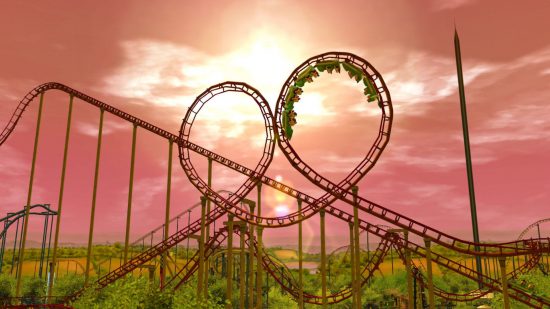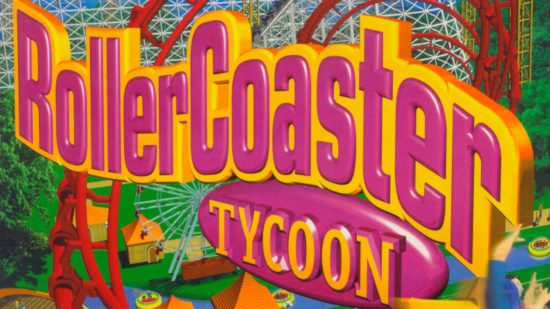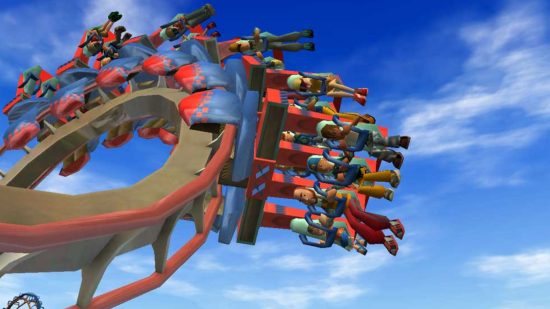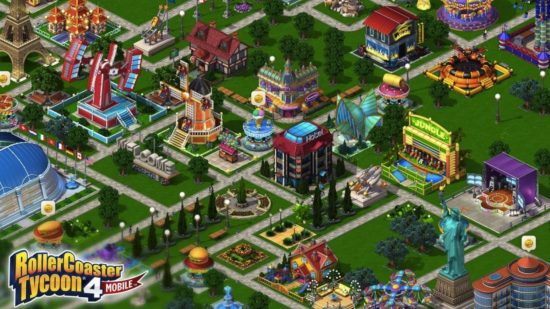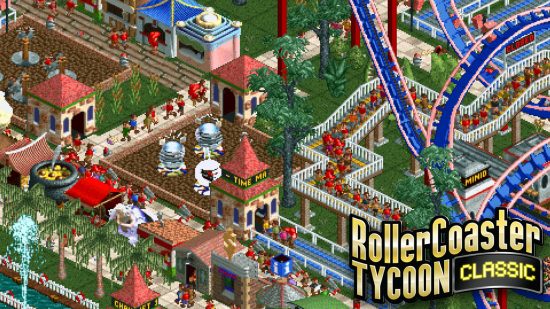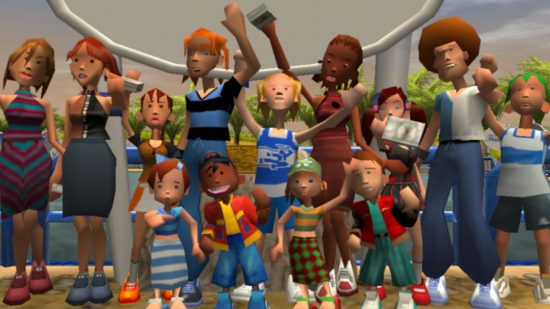Ah, the year 2004. As Christmas day arrived, my nine-year-old self woke at 4:30 AM to open presents, poking through the pile for anything that felt like it might have a disc in it. Then I opened it, RollerCoaster Tycoon 3 for PC, and for a full year afterwards, I could think of nothing else.
All this time later and I still love the RollerCoaster Tycoon series, though admittedly, after all this time, there’s never been another series entry to provide the thrill of providing thrills like RCT3 and the games that came before, and there’s a good reason for that. So strap yourself in, hold on tight to the restraints, and allow me to take you on the wild ride that is the history of RollerCoaster Tycoon, from the dizzying heights of the early noughties to the mobile malaise the series finds itself in today.
Like many iconic early gaming titles, RCT had some humble beginnings. The brainchild of lead developer Chris Sawyer, the original RollerCoaster Tycoon came about from the success of 1994’s Travel Tycoon, also from Sawyer, and the finances from that title providing the developer with the cash to tour Europe and the U.S.A, taking in some of the most elaborate theme parks around in the process.
Funnily enough, the project isn’t a result of Sawyer’s love for the coasters of the world. In fact, the developer has been quoted as saying he had a dislike for the steel beasts at the time, but rather he felt it was the natural evolution for the isometric engine he had used to create Travel Tycoon. In fact, RollerCoaster Tycoon began life as something of a passion project rather than a surefire release, with Sawyer influenced by Bullfrog’s Theme Park and a book he had called White Knuckle Ride that’s packed with pictures of some of the world’s most impressive coasters. He quickly learned to love the world of theme parks, and this would drive him further into his RCT project.
If Sawyer had thought Travel Tycoon changed his life, RCT was about to attach rocket boosters to his already successful game developer career. Working alongside industry professionals for funfair fact-checking, graphics from future long-term collaborator Simon Foster, and publisher Hasbro for playtesting, Sawyer managed to piece together the first title in the series, ready for release in early 1999.
Despite both the developer and publisher only anticipating a modest return on their efforts with RollerCoaster Tycoon, things quickly escalated, with the developer telling Arcade Attack “it was a shock a few months later though to find out that sales had ramped up considerably and the game was now amongst the top selling games for the PC for that entire year”. In that first twelve months, RCT for PC sold over 700,000 copies, pulling in revenue in excess of fifteen million dollars. The sales didn’t stop after the debut year though, with only The Sims picking up more sales in the years 2000 and 2001, and by the end of 2004, there had been over four million copies shifted. Clearly, there was space for a sequel.
So Sawyer did what he does best, he made another tycoon game. With everything he learned from the first one, a bunch of community feedback, and an engine ready to go, RollerCoaster Tycoon 2 hit the market October 2002. While little changed from the original title, something critics were keen to point out at the time, RCT2 was always going to be a commercial success, and the title would earn over 20 million dollars before reaching its second anniversary.
Following the wild success of RCT2, Sawyer stepped away from the project, assuming that the future of the series would be in 3D, and according to his own words from a Eurogamer interview back in 2016, he “just couldn’t get all that excited about taking the game in that direction for some reason, so the right thing to do was to hand the game over to others who were excited and inspired enough to take the game forward”. This decision turned out to be a blessing and a curse, in that order, for the legacy of the RCT series. While the first title with Sawyer as an absentee rights holder saw success in the shape of RollerCoaster Tycoon 3, that very game I came rocking down the stairs on Christmas morning for, things very quickly plummeted like, well, a roller coaster.
RCT3 proved a success for Sawyer’s choice of takeover developer, Frontier Developments, with the IP creator only serving as a consultant during the process while he concentrated his efforts on Chris Sawyer’s Locomotion. While Locomotion didn’t prove to be the reinvigoration of the Travel Tycoon Sawyer was hoping for, RCT3 did at least continue the trend of commercially lucrative entries in the series, and presumably, the developer assumed he could rest easy with the legacy of his most iconic series in the hands of those who can continue to make it a success. What he didn’t account for was Atari.
Now, if you’ve ever played a RollerCoaster Tycoon mobile title, you know exactly what’s coming. As the first true mobile gaming boom of the early iPhone and Android era began to erupt, Atari was plotting how it might make RCT into a functioning mobile title. Spoilers – they didn’t plot well enough.
Functioning is a generous term for the mess that was RollerCoaster Tycoon 4 Mobile, released back in 2014, with reviewers leaving scathing write-ups with lines like “at this point, you would be far better off picking up a copy of RollerCoaster Tycoon 2 than dishing any money out for this one” and “I never would have thought I’d say this about a video game, but RollerCoaster Tycoon 4 Mobile is just absolutely sickening”. Again, those aren’t the words of online edgelords in dark corners of the internet either, those are hard quotes from actual reviews, and something we can only assume made Sawyer and anyone else involved in the origins of the series wince like they were spinning on a malfunctioning ferris wheel.
There are many reasons why RCT4 Mobile sank like a stone, but the most predominant peeve of all the reviewers, and those unlucky enough to pick up the game of their own accord, was the overbearing presence of microtransactions. The base game is entirely reliant on buying stuff, mindless stuff assigned to annals of history less than ten years later, but something Atari somehow anticipated would be a boon for their surefire mobile hit.
Since 2014, RCT has gone on to release disappointing mobile title after disappointing mobile title – with the exception of RCT Classic, which we’ll touch on later – never stopping to think, “hey, I wonder why people don’t like this”. In the repeated attempts, we’ve seen not only bad versions of the classic RCT simulation format, but also a poorly received puzzle game, and in what feels like a real-life puzzle that no one ever had the answer for, a rollercoaster-based shooter also. Really, just Google RollerCoaster Tycoon Joyride, and witness what looks like an awful way to spend thirty minutes.
There is, though, despite all the doom and gloom of the RCT mobile era, one redeeming title from the last ten years, and unsurprisingly, it’s only here because of Chris Sawyer. RollerCoaster Tycoon Classic is the spiritual successor to RCT2, the undisputed highlight of the series, recreating the classic isometric game world with touchscreen controls and a wealth of scenarios to fulfil. To date, RCT Classic is the best-received title from the entire series, with a MetaCritic rating of 90, and a user score of 85.
So, where is RollerCoaster Tycoon today? It’s hard to say, is the answer. Planet Coaster is now the big dog of the theme park tycoon sub-genre, and funnily enough, Frontier Developments developed it, the same people who picked up the reins after Sawyer had decided he wouldn’t be the one to forge RCT into the 3D future. In fact, had the 2010’s not been littered with substandard RCT mobile titles, Planet Coaster might not have dropped the name, with studio head David Braben describing the series at that time by saying “it comes with too much baggage. There were too many tycoon games that weren’t very good”. Your words David, not ours.
In terms of the spirit of the early noughties tycoon titles, the Two Point series is seemingly up for the challenge of adopting that mix of tongue-in-cheek game worlds with intricate simulation design. While it feels more of a nod to Theme Park World, the closest RCT ever had to a competitor in the market, it’s safe to say that if it weren’t for the work Chris Sawyer’s early titles did that made my generation and those around it fall in love with the tycoon format, it’s hard to see the Two Point titles ever being made.
Ultimately, the legacy of Rollercoaster Tycoon is not lost, despite what my headline might have you believe – got you there – it just needs some unpacking to truly understand. If anything, in an age where those with the most money feel they can buy the rights for whatever they like and use them however they want, the history of RCT reminds us that those who take pride in their work, like Sawyer himself and the people at Frontier Developments, will always outshine the likes of Atari, who continue to use the good name of RCT to shovel low quality garbage into the open mouths of those us desperate for an extra morsel of what we think we know. A legacy is not in a name, it’s in a feeling, and if Planet Coaster is the closest I’m going to get to recreating that feeling of loading up RollerCoaster Tycoon 3 on Christmas day, then I guess I’m going to play some Planet Coaster. Sorry, Atari.
